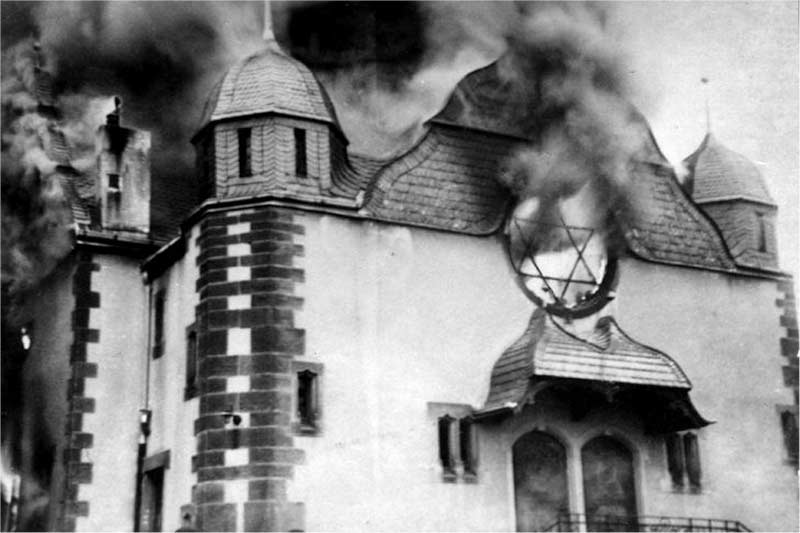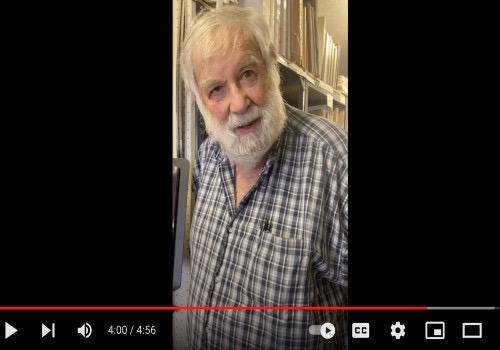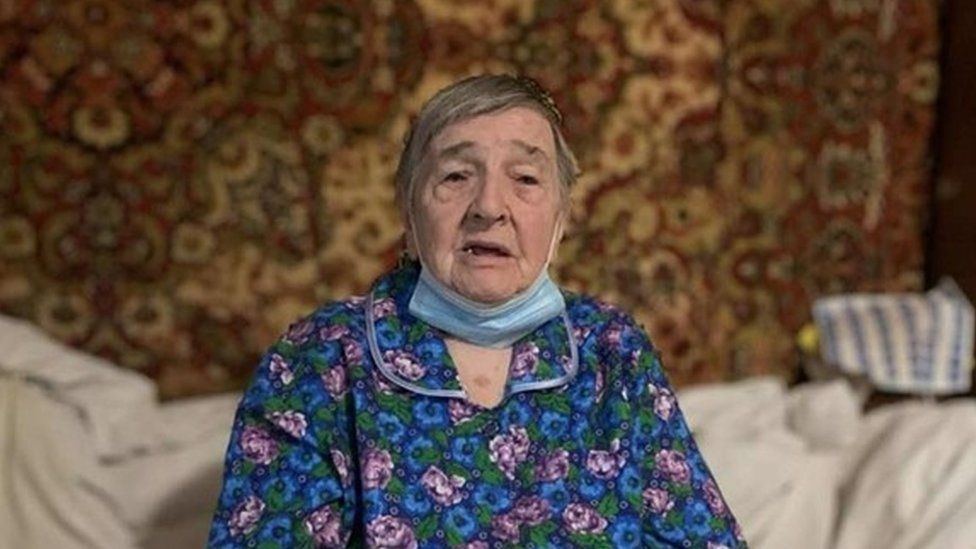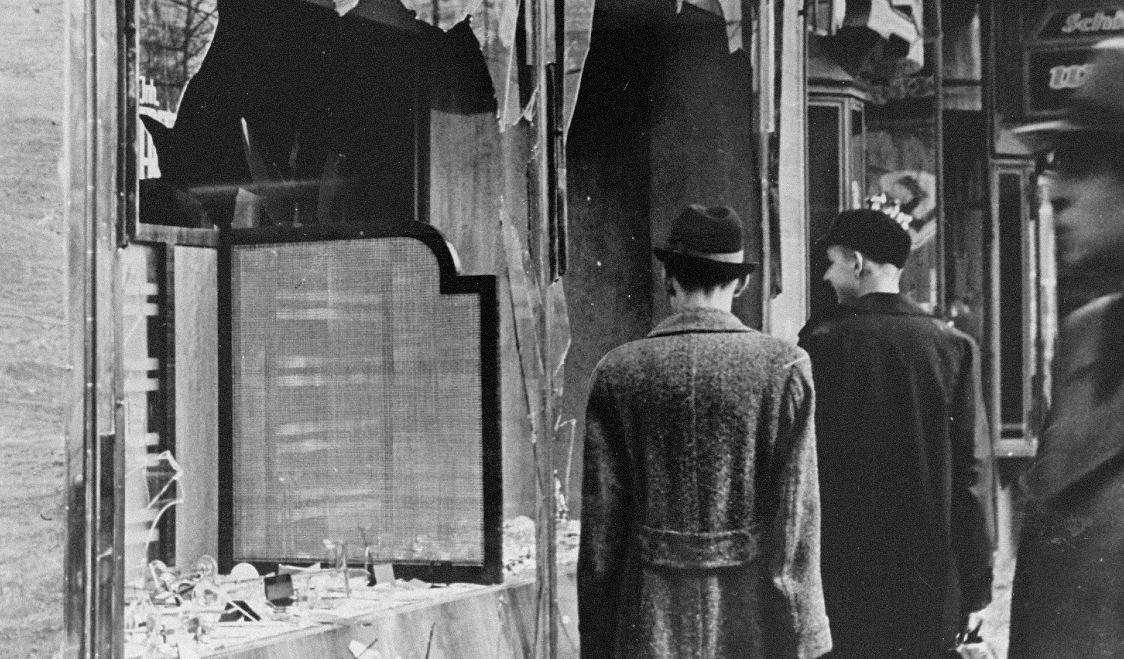Three weeks ago, on his 90th birthday, Holocaust survivor Werner Salinger welcomed his fifth great grandchild into the world. He’s pretty sure that his granddaughter Alicia had something to do with the timing:
“I don’t know quite how she did that, but the water broke and the kid was born on April 5. Which was her plan all along!”
I met Werner earlier this year as I was telling the story of an artist named Robert Sutz who for 20 years has been chronicling the experiences of survivors. During our interview, Werner described “Kristallnacht” — the 1938 Nazi assault on Jews in cities and towns across Germany, including his hometown of Berlin:

“I remember that very vividly, although I was only six. I remember all the broken glass and the acrid smoke from the synagogue about a block away burning, kind of drifting over our apartment.”

I was thinking about Werner yesterday, on the eve of Yom HaShoah — the Holocaust Day of Remembrance. I had been reading about a 91-year-old Ukrainian woman named Vanda Semyonovna Obiedkova, who died three weeks ago as Putin lay siege to Mariupol.
In 1940, at the age of 10, Vanda’s mother was dragged away by the Nazis. Her mom and thousands of others were executed in a mass grave in Mariupol. Eighty years later, one day before Werner became a great grandfather for the fifth time, Vanda became the second Holocaust survivor to die in the Russian invasion.

I’ve written many stories over the years about Holocaust survivors, and besides being Jewish, the biggest thing I have in common with these brave people is a shared motivation: That the world can never forget. That it can never happen again.
“Never again.”
Over the last eight weeks, a great many people have come to believe that that phrase is being tested in real time. And that the free world is failing this test miserably. For while the horrors we’re witnessing in Ukraine are not commensurate with the 11 million innocent lives snuffed out by the Holocaust — there is no question that we are all watching innocent people being bombed, tortured and killed. Comparing the historical degree of all the killing is meaningless to the Ukranians who’ve lost loved ones and who’re living under mortal threat every day. Murder is murder.
As we watch this senseless brutality playing out on TV daily like some interminable war series on the History Channel, there are some who want America/NATO to go in (two months ago) and obliterate Putin’s military. You may be one of them.
Others express that as exasperating as it is to helplessly witness this war from afar, risking Putin’s use of mass killing weapons is not the right course of action at this moment. You may be one of them.
But on this 72nd Yom HaShoah, the person’s answers I was most interested in hearing were Werner Salinger’s. Not only did he carry the ghastly memories of the Third Reich from his childhood; he returned to Germany 15 years later to work military intelligence as a member of the U.S. Air Force. He has also spent years in Russia and was there during the 1991 coup against Gorbachev. Werner seemed like someone who carried some moral authority on the subject. So I called him up and asked him about it. On a gut level, how does it feel watching this horror?
“My first reaction is that it is not understandable that the world is so held hostage, that we can’t do anything about it. We just sit and watch every day innocent people being killed because of this madman named Putin in Moscow. That’s my first reaction.”
Right. But what’s the point of “never again” if the democratic powers of the world that have the capacity to do something about it — choose not to?
“Well, the term ‘never again’ of course applies mostly to what Jews experienced during the Holocaust. And the generations that have followed the survivors of the Holocaust say ‘never again,’ rightfully so. I’d go to my death bed saying ‘never again.’ But to answer your question, what should we do, or what will we do? There will come a point at some point, and I hope it’s sooner rather than later, that people will have to sit around the table and negotiate an end to this.”
Werner hates the fact that this is the option he would choose. But he doesn’t think it’s much of a choice:
“I don’t think we can take the chance to roll the dice, because there are many ways that Putin could react, and not all of them are nuclear. There are chemical ways, there are cybersecurity ways. There are many ways he can foul up the world. Now, you can say: ‘Well, he is not likely to do that because he would be committing suicide.’ Well, I don’t know.”
None of us know. And that is the point. It’s at the core of this tragedy. Our hearts tell us to go in and beat the holy crap out of this mass murderer. Our heads try to calculate how likely will it be that an action like that could trigger other actions that could lead to a whole other level of loss of life — the kind that this Day of Remembrance is all about. Like so many of us, Werner sees it as a Sophie’s Choice where there’s no easy short term answer:
“Yes, it is. It’s brutal to watch. And yet… There’s an old song that says: ‘the only way out is through.’ The only way out is through. So we have to go through this, whatever direction it takes. And I think we have to end up with some off ramps for both sides.”
Werner and I talked for about 45 minutes, but we could have kept going. A fascinating guy, he worked in intelligence and diplomacy for Presidents Dwight Eisenhower and Jimmy Carter. All of his experience led him to author a book entitled Toward a More Equal World. I can’t wait to read it.
On this Yom HaShoah, we extend our everlasting love to all those we have lost, and our deepest thanks to all of the survivors who continue to tell the story to keep their memory alive.


